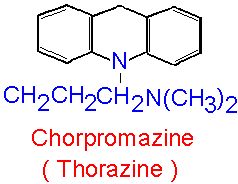| iPsychology
|
|
Chlorpromazine ( Thorazine )
Chlorpromazine ( Thorazine ) is an antipsychotic drug of low-potency used to treat schizophrenia. Chlorpromazine ( Thorazine ) is used in the treatment of disorganized and psychotic thinking. Also used to help treat false perceptions (e.g. hallucinations or delusions.) Chlorpromazine ( Thorazine ) is also sometimes to treat psychotic children. It may be used to treat sever hiccups or protracted nausea. Chlorpromazine ( Thorazine ) is also prescribed for the short-term treatment of severe behavioral disorders in children, including explosive hyperactivity and combativeness; and for the hyperenergetic phase of manic-depressive illness ( severely exaggerated moods ). Chlorpromazine ( Thorazine ) is also used to control nausea and vomiting, and to relieve restlessness and apprehension before surgery. It is used as an aid in the treatment of tetanus, and is prescribed for uncontrollable hiccups and acute intermittent porphyria ( attacks of severe abdominal pain sometimes accompanied by psychiatric disturbances, cramps in the arms and legs, and muscle weakness ). Strengths:
Dosages: Actual dosage must be determined by a physician. Adults:
Normal dosage:
Problems with:
Take With: Full Benefits In: Up to 3 months.. Missed Dose(s): If within one hour take, if over an hour skip and then continue on your normal schedule. Never Take a Double Dose. If Stop Taking: Do not stop without consulting your physician . Overdose symptoms include: Parkinsonism, acute dystonias, somnolence, seizures, dry mouth, blurred vision, urinary retention, tachycardia, cardiac arrhythmias, hypotension, hypothermia or, hyperthermia. Can be fatal. Warnings
Antacids containing aluminum or magnesium should not be taken one hour before taking this drug and never right after. Only take this drug and Heterocyclic antidepressants with careful monitoring. Also check with your physician if you are taking central nervous system depressants like antihistamines, hay fever medicines, sedatives, narcotics, anesthetics, barbiturates or muscle relaxants. Also check with your physician if you are taking a vasodilator (drug that dilate blood vessels.) The habit-forming potential is none, but long term use may lead to Tardive Dyskinesia. Do not take this drug if you are pregnant ( Only take if the mother's or baby's life is endangered. ) Do not take this drug if planning to become pregnant. Do not take if you are breast-feeding. Do not give this drug to anyone under six months old. Only use drug in small doses at first if over sixty and with close monitoring. Also if over sixty be careful when standing up because blood pressure may be lowered enough to impair balance. Do not use if: You had negative reactions to this drug or any other phenothiazine in the past. Inform your Doctor if: You had negative reactions to this drug or any other phenothiazine in the past. If you have epilepsy or asthma. If you have cardiovascular or liver disease. If you are taking any other prescription or nonprescription drug. If you plan to be under anesthesia or having any surgery in the next few months, also if you will be undergoing any medical tests. If you are on a special diet ( low-salt / low-sugar or any other.) Thorazine may cause tardive dyskinesia--a condition marked by involuntary muscle spasms and twitches in the face and body. This condition may be permanent, and appears to be most common among the elderly, especially women. Ask your doctor for information about this possible risk. Chlorpromazine ( Symptoms or Effects ) Common: Lethargy / sleepiness, low blood pressure, dry mouth, blurred vision, constipation, weight gain, difficulty urinating or stiffness. Abnormal secretion of milk, abnormalities in movement and posture, agitation, anemia, asthma, blood disorders, breast development in males, chewing movements, constipation, difficulty breathing, difficulty swallowing, dizziness, drooling, drowsiness, dry mouth, ejaculation problems, eye problems causing fixed gaze, fainting, fever, flu-like symptoms, fluid accumulation and swelling, headache, heart attack, high or low blood sugar, hives, impotence, inability to urinate, inability to move or talk, increase of appetite, infections, insomnia, intestinal blockage, involuntary movements of arms and legs, tongue, face, mouth, or jaw, irregular blood pressure, pulse, and heartbeat, irregular or no menstrual periods, jitteriness, light-headedness (on standing up), lockjaw, mask-like face, muscle stiffness and rigidity, narrow or dilated pupils, nasal congestion, nausea, pain and stiffness in the neck, persistent, painful erections, pill-rolling motion, protruding tongue, puckering of the mouth, puffing of the cheeks, rapid heartbeat, red or purple spots on the skin, rigid arms, feet, head, and muscles (including the back), seizures, sensitivity to light, severe allergic reactions, shuffling walk, skin inflammation and peeling, sore throat, spasms in jaw, face, tongue, neck, mouth, and feet, sweating, swelling of breasts in women, swelling of the throat, tremors, twitching in the body, neck, shoulders and face, twisted neck, visual problems, weight gain, yellowed skin and whites of eyes. Rare: Dizziness, racing heartbeat / palpitations, weakness, sexual problems, restlessness, skin rash, seizures, low white blood cell count, tremors or involuntary facial / tongue movements. See physician always: Low blood pressure, dizziness, racing heartbeat / palpitations, weakness, sexual problems, restlessness, skin rash, stiffness, seizures, low white blood cell count, tremors, reduced urinary output, difficulty urinating or involuntary facial / tongue movements. See physician if severe: Lethargy / sleepiness, dry mouth, blurred vision, constipation or weight gain. See physician NOW: Involuntary facial / tongue movements or skin rash. Stop taking and see physician NOW: Seizures. Chlorpromazine ( Thorazine ) Interactions
|

